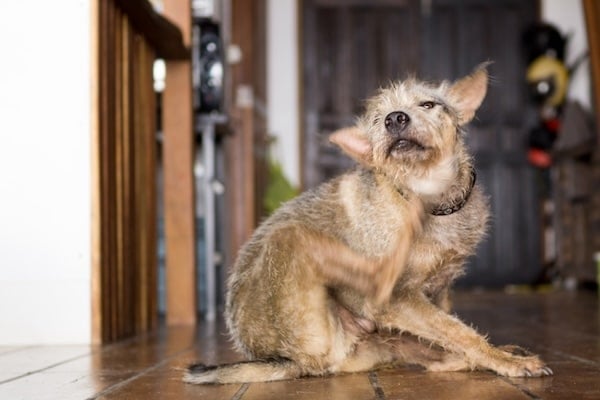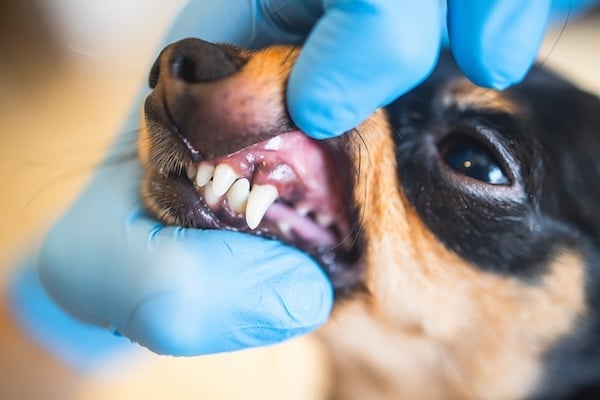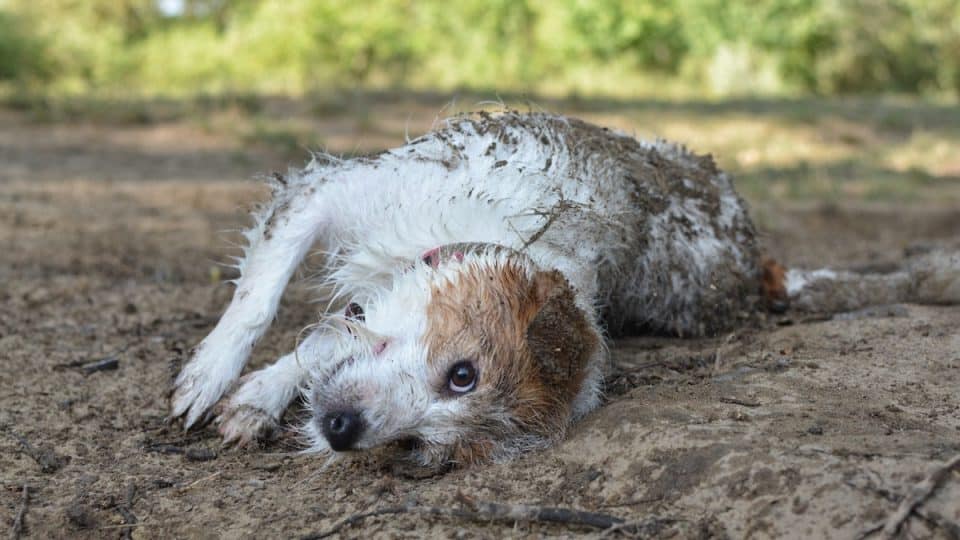- Not a substitute for professional veterinary help.
As much as we love our dogs, their smell is sometimes a different story. Dogs don’t shower daily, and they aren’t always daisy-fresh. But there’s a difference between smelling “a little doggy” and “something died.” If your pup is suddenly—and persistently—stinky, it may be time to investigate.
“All dogs have their own natural scent,” says Dr. Kelly Hood, a small animal veterinarian and consultant for California Dog Kitchen. “The distinct doggy odor tends to be most noticeable around their ears, paws, and the area under the tail. This musky odor is part of a dog’s normal scent signature.”
In a healthy adult dog, that smell shouldn’t be enough to make you wrinkle your nose in displeasure. If your dog is stinky—or really, really, stinky—even after a bath, that can be a sign that it’s time for a checkup at the vet. We’ve compiled everything you need to know about why your dog might be smelling so bad and what to do about it.
Common Reasons a Dog Smells Bad
If you’ve noticed your dog has a stronger-than-usual smell lately, there could be several reasons. Sometimes a dog’s stink is all on the surface, thanks to a buildup of dirt, grime, and whatever they might have encountered in the yard. Other times, the cause is more concerning.
“Noticeable odors can be due to infection, dental disease, or skin issues,” says Dr. Kelly Hood. These odor-causing concerns should be addressed as soon as possible.
Below are some of the most common causes of dog odor.
Poor hygiene, anal glands, and grooming
Skipping regular baths and grooming routines can lead to a buildup of unpleasant odors. Active dog breeds, especially retrievers and herding dogs, often get smellier between baths.
Dogs also have scent glands near their anus. Usually, these glands empty when they go to the bathroom. However, when the anal glands get blocked, they produce a strong and unpleasant odor. Expressing the glands as part of your regular grooming routine can help keep your pup comfortable and stink-free.
Skin infections and allergies
Dr. Hood says allergies and skin issues can change how your dog smells. “Allergic or sensitive skin dogs can have an underlying odor during peak allergy season,” she explains. Allergies can cause overall skin irritation and inflammation, which can lead to an overproduction of oils and an overgrowth of yeast on the skin.
Some dogs are more prone to skin issues, particularly those with thick folds in the skin. Dogs with long or floppy ears also have an higher risk of ear infections, which can produce a foul odor. In both cases, the smell will be localized to the infection site and may smell slightly metallic. You will likely also notice itching, red skin, or hair loss.

Placebo365 via iStock
Dietary issues and allergies
Dogs with an upset stomach may burp or fart more, leaving a smelly odor behind. Their poop can also be particularly stinky.
If your dog is eating too much or too fast, they’re more likely to have gas. Other gastrointestinal conditions such as food allergies, inflammatory bowel disease, or parasites could also be the underlying source of the smell. With dietary issues, your dog probably won’t be smelly all the time, but they’ll frequently pass stinky gas that you can’t help but notice.
Weather and activities
Sometimes, the answer to your dog’s odor is simple: it’s hot or wet outside, they spent the day at the lake, or they rolled in something stinky. Heat and rain can increase your dog’s natural musky smell, while smelly substances from the environment can transfer to your dog’s fur.
In these cases, the smell probably came on suddenly. It’s also usually fairly generalized, meaning that they’re stinky all over—and easily remedied with a bath.
Medical Conditions That Make a Dog Stink
Certain health issues like diabetes, kidney disease, ear infections, or urinary tract infections (UTIs) can make dogs smell bad.
“It’s a good idea to check in with your veterinarian, especially if the smell is strong, fishy, or accompanied by other symptoms such as itching, licking, redness, or discharge,” recommends Dr. Hood. “A really strong, foul smell like something fishy, rotten, or sour can indicate a medical issue.”
When presented with a stinky dog, Dr. Hood explains that a veterinarian will conduct a full medical exam, paying particular attention to your dog’s skin, ears, mouth, and rear. If they find something suspicious, they may take a sample from the area and run tests for bacteria or yeast. Sometimes, bloodwork is necessary to determine the root cause of your dog’s smell.
She encourages pet parents to trust their gut in determining whether to take a pup to the vet, noting that “it’s always worth checking if something smells ‘off’ and doesn’t go away.”
Diabetes
A diabetic pup’s breath often smells sweet or fruity. Due to a lack of insulin, their body is burning fat instead of sugar, and the sweet smell is the result of ketone production.
While it’s one of the more pleasant unusual smells your pup could have, diabetes is very dangerous in dogs. Other symptoms of diabetes include:
- increased appetite or thirst
- more frequent urination
- weight loss
- lethargy
- A dull coat
- Vomiting, weakness, or seizures in extreme cases
Infections
Yeast, fungal, eye, ear, and skin infections produce a range of odors in dogs, depending on their cause. Skin infections often come with a musty or cheesy scent. When yeast is to blame, the smell ranges from musty to sweet. Severe infections can smell putrid, like something is rotting.
Bacterial or fungal infections often come with:
- Scratching
- Red spots in the skin or coat
- Hair loss
- Discharge from the infection site, whether around the eyes or on the skin
Lethargy, unusual behaviors, and avoidance of food and water can also happen. These usually indicate that your dog is extremely uncomfortable.
UTI/Incontinence
If your dog has a UTI, or urinary tract infection, the smell of their pee will be unusually strong—and unusually unpleasant. UTIs are caused by bacteria in the urinary tract, which includes the urethra, kidneys, and bladders.
Other symptoms of a UTI include:
- frequent urination
- bloody pee
- straining to pee
- frequent licking of the genitals
An incontinent dog will smell of urine—and so will their bed, their toys, and possibly your furniture. Incontinence causes a dog to unintentionally leak pee between trips outside. Incontinence can be caused by a UTI, hormonal imbalances, and aging.
Dental disease
If the bad smell is coming from your dog’s mouth, it could be their teeth or gums. “Bad breath can be pretty potent if there’s plaque buildup or gum disease,” says Dr. Hood.
Gum disease affects up to 90% of dogs over three years old. Other symptoms include:
- redness or swelling in the gums
- bleeding around the teeth
- discomfort while eating or reluctance to eat
Brushing your dog’s teeth regularly, dental chews, and trips to the vet for cleanings can all help remove plaque and treat or ward off gum disease in dogs.

Nikolay Tsuguliev via iStock
Genetics
Environment and activity are more common culprits of dog stinkiness, but genetic predispositions can sometimes increase a dog’s risk of odors:
- Dogs with long, floppy ears are more prone to ear infections
- Pups with deep folds of skin are more likely to trap irritation-causing water and moisture
- Dogs with thick coats will probably smell worse in hot weather than their thin-haired friends
Understanding how your dog’s genetic makeup impacts their everyday life can help you prevent issues and identify the cause when they arise.
How To Get Rid of Dog Smell
If your dog’s odor is due to poor hygiene or rolling in something smelly, giving your dog a bath should take care of the issue—or, at least, it’ll make things better until their next frolic.
A bath also functions as a diagnostic. “If the smell comes back quickly, persists, or worsens, it might be some underlying issue,” Dr. Hood explains. Here’s what you can do.
Home remedies for stinky dog
“For dogs who are otherwise healthy but just a little smelly, commit to frequent grooming,” says Dr. Hood. “At home bathing with a gentle, soap-free dog shampoo and making sure their bedding is washed regularly can help.”
Balance is key, however: “Too many baths or the wrong products can dry out the skin and make things worse,” warns Dr. Hood.
Some other at-home remedies to consider include:
- Changing their diet. If your dog’s smell is from skin or tummy issues, changing their diet might help. Sometimes, dogs are allergic to certain foods like chicken or beef, so your vet might recommend a simple diet to find out what bothers them.
- Upgrading their grooming routine. In addition to regular baths, make sure to include an ear cleaning once a month. Some dogs may also need particular attention to keep their eyes, anal area, and paws clean as well.
- Brushing their teeth. If your dog’s breath smells bad, brushing their teeth regularly can help prevent plaque buildup. Dental chews and dog-safe mouthwashes can also help.
- Teaching “leave it.” If your dog likes to roll around in poop, the “leave it” cue can come in handy. When they seem interested in something smelly, use the cue to stop them and avoid extra baths.
- Washing their bedding and gear. A dog who rolled in something stinky can easily transfer the smell to bedding, blankets, harnesses, and toys. Create a regular washing routine for pup stuff to keep the smell from coming back.
Veterinary treatments for bad dog odors
When your dog’s stink is medical, a veterinarian’s help may be needed. With treatment, a vet can not only address the smell, but also the underlying causes. Treatment of infection, diabetes, and other odor-causing conditions may include:
- Prescription diets. For dogs with extreme food sensitivities or GI issues, specialized hypoallergenic diets may reduce irritation and calm the gut for less-stinky emissions. Vets have access to a wider range of these diets, allowing them to prescribe particular foods to help your dog feel (and smell) better.
- Medicated shampoos. For dogs that are suffering from skin allergies, irritation, or infections, a prescription bath delivers essential medication to treat the problem and soothe your dog’s delicate skin at the same time.
- Medications. Antibiotics, diabetic treatments, and more get to the root of the problem, addressing your pup’s smell from the inside out. While over the counter treatments may help with some of your dog’s symptoms, only prescription medications have the power your dog may need to feel better.
- Dental care. Like humans, dogs benefit from routine dental care, including check-ups and professional cleanings to remove the buildup of plaque on the teeth. Your veterinarian should be checking your dog’s teeth with every visit, and can recommend the right schedule to keep your pup’s chompers fresh.
Preventing a Stinky Dog
When it comes to preventing a stinky dog, Dr. Hood says it’s all about the basics: “Routine care can prevent odors, along with keeping your dog at a healthy weight and feeding a balanced diet,” she explains.
She recommends against using perfumes to mask the smell, as they can irritate your dog’s skin—and they won’t really solve the problem anyway.
“A clean, healthy dog shouldn’t need perfume to smell good,” she says.



